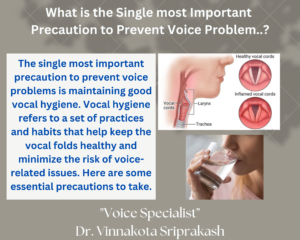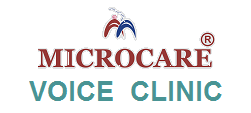The single most important precaution to prevent voice problems is maintaining good vocal hygiene. Vocal hygiene refers to a set of practices and habits that help keep the vocal folds healthy and minimize the risk of voice-related issues. Here are some essential precautions to take:
“7 Essential Tips for Maintaining a Healthy Voice”
 1. Stay hydrated: Drink plenty of water throughout the day to keep your vocal folds moist. Adequate hydration helps prevent vocal strain and ensures proper vocal fold function.
1. Stay hydrated: Drink plenty of water throughout the day to keep your vocal folds moist. Adequate hydration helps prevent vocal strain and ensures proper vocal fold function.2. Avoid vocal abuse: Refrain from shouting, screaming, or speaking loudly for prolonged periods. Excessive vocal strain can lead to vocal fold damage and the development of voice problems.
3. Take regular breaks: If you engage in activities that require prolonged voice use, such as singing, public speaking, or using your voice extensively, take regular breaks to allow your vocal folds to rest.
4. Avoid irritants: Minimize exposure to irritants such as cigarette smoke, excessive dust, allergens, and chemical fumes. These can irritate the vocal folds and contribute to voice problems.
5. Practice proper breathing techniques: Learn and practice diaphragmatic breathing techniques to support your voice effectively. Breathing from the diaphragm helps reduce strain on the vocal folds and promotes better vocal control.
6. Warm up your voice: Before engaging in demanding vocal activities, warm up your voice with gentle vocal exercises and stretches. This helps prepare the vocal folds and muscles for vocal use, reducing the risk of injury.
7. Maintain overall health: Take care of your general health by getting enough sleep, managing stress levels, and adopting a balanced diet. A healthy lifestyle promotes overall well-being, including vocal health.
If you experience persistent or recurring voice problems, it’s important to consult a healthcare professional, such as an otolaryngologist (ear, nose, and throat specialist) or a speech-language pathologist. They can provide you with personalized guidance and further evaluate your condition.
Contact: 9494940725
 Microcare Voice Clinic in Hyderabad
Microcare Voice Clinic in Hyderabad
